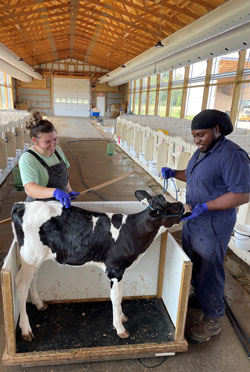Dairy industry researchers with Miner Institute are currently at the 2023 Smart Calf Rearing Conference in Germany to share the results of their Northern New York Agricultural Development Program (NNYADP)-funded project investigating kefir as a probiotic supplement for newborn calves. This June, Miner Institute Research Scientist Sarah Morrison, Ph.D. and Cari Reynolds, a graduate student in animal bioscience, will present the project results at the 2023 annual meeting of the American Dairy Science Association in Ottawa, Ontario.

“This research provided the opportunity to consider a potential preventative care strategy to promote the health and growth of neonatal dairy calves,” Morrison said.
Kefir is a fermented beverage traditionally made with cow’s milk. It contains substantial amounts of probiotic bacteria, many with antimicrobial properties. This NNYADP –funded dairy research sought to determine if kefir could be used to decrease the risk of diarrhea in newborn dairy calves. Diarrhea is the leading cause of death in calves less than one month old.
Data was collected from calves in the Miner Institute dairy herd as well as at Hidden View Farm in Clinton County and Mapleview Dairy in St. Lawrence County. Datasets present information on feed nutrient content and intake, calf growth and health scoring, transfer of passive immunity, the incidence of diarrhea, and antibiotic usage for groups of calves supplemented with kefir and those that did not receive kefir.
Cumulative observations of diarrhea, also known as scours, in the calves at each farm did not differ between the kefir-no kefir treatments, nor did the likelihood of medical intervention with antibiotics to treat scours.
However, the report notes that on one farm “while treatment did not affect cumulative preweaning starter (feed) intake, calves in the kefir treatment group consumed nearly six pounds more starter than calves in the control group during the preweaning period.” The report also notes that calves fed kefir on another farm were more likely to meet or surpass their target weight at eight weeks of age.
One of the three farms in the project continues to use kefir as part of its feeding strategy.
“The increased starter dry matter intake in calves receiving kefir on one farm suggests a potential metabolic or developmental benefit to the calf that could be explored with future research. This project also suggests further exploring of the potential of probiotic supplementation in support of well-informed antibiotic stewardship,” Morrison notes.
This 2022 research project builds on the 2020 NNYADP project that worked with 16 dairy farms in northern New York to identify the main enteropathogens that contribute to diarrhea in neonatal dairy calves and the associated use of antibiotic treatment. That study indicated the need to develop a consistent and reliable way to identify the specific cause of a calf’s diarrhea to more effectively and efficiently treat the calf, and secondarily reducing unnecessary antibiotic usage. That earlier project evaluated the use of electrolytes and free choice water as supportive treatment practices.
Funding for the Northern New York Agricultural Development Program is supported by the New York State Legislature through the New York State Assembly and administered by the New York State Department of Agriculture and Markets.



